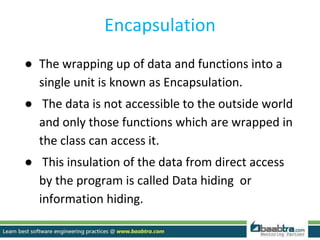Oops in java
- 3. What is OOP? ● Object-oriented programming (OOP)style of programming that focuses on using objects to design and build applications. ● Think of an object as a model of the concepts, processes, or thing in the real world that are meaningful to your application.
- 4. What Are Objects? ● Software objects model reaL-world objects - dog, bicycle, etc. ● Real-world objects have states and behaviors -Bicycle’s states or properties: name, color, model -Bicycle’s behaviors or action : riding, changing gears ● How do Software objects implement real-world objects? -Use variables to implement states -Use methods to implement behaviors ● An object is a software bundle of variables and related methods
- 5. Definition ● Class : -is the base design of objects ● Object :- is the instance of a class • No memory is allocated when a class is created. • Memory is allocated only when an object is created.
- 6. OOP FEATURES ● Abstraction ● Encapsulation ● Polymorphism ● Overriding ● Inheritance ● Interfaces
- 7. Data Abstraction ● Abstraction refers to the act of representing essential features without including the background details or explanations. ● Since the classes use the concept of data abstraction , they are known as the abstract data types.
- 8. Encapsulation ● The wrapping up of data and functions into a single unit is known as Encapsulation. ● The data is not accessible to the outside world and only those functions which are wrapped in the class can access it. ● This insulation of the data from direct access by the program is called Data hiding or information hiding.
- 9. Polymorphism In polymorphism refers to a programming language ability to process objects differently depending on their data type or class. More specifically, it is the ability to redefine methods for derived classes.
- 10. For example, given a base class shape , polymorphism enables the programmer to define different area methods for any number of derived classes, such as circles, rectangles and triangles. No matter what shape an object is, applying the area method to it will return the correct results. Polymorphism is considered to be a requirement of any true object-oriented programming language (OOPL).
- 11. Example Public class shape { int calculateArea(int width,int height) { return width*height; } float calculateArea(int radius) { return(22/7)*radius*radius; } } public class example { Public static void main(string args[]) { Shape sh=new shape(); System.out.println(sh.calculateArea(10)); } }
- 12. Method Overriding ● We have two classes and both classes have a function with the same name and same Parameters inheritance is necessary. ● For Example class B { public void f1(int x,int y) { System.out.println(x+y); } }
- 13. class A extends B { public void f1(int x,int y) { System.out.println(x*y); } public static void main(String ar[]) { A a=new A(); a.f1(5,5); B b=new B(); b.f1(2,3); } }
- 14. Inheritance ● In object-oriented programming, inheritance is the concept that when a class of objects is define, any subclass that is defined can inherit the definitions of one or more general classes. ● This means for the programmer that an object in a subclass need not carry its own definition of data and methods that are generic to the class (or classes) of which it is a part. ● This not only speeds up program development; it also ensures an inherent validity to the defined subclass object .
- 15. Example Public class shape { protected int width; protected int height; Int calculateArea(int x,int y) { Return x*y; } Public class dimensionshape extends shape { Private int depth; Int calculateVolume() { Return width*height*depth; }
- 16. Interface ● An interface is a collection of abstract methods (it means all methods are only declared in an Interface). ● A class implements an interface, thereby inheriting the abstract methods of the interface. ● And that class implements interface then you need to defined all abstract function which is present in an Interface. ● An interface is not a class. ● Writing an interface is similar to writing a class, but they are two different concepts. ● A class describes the attributes and behaviors of an object and interface contains behaviors that a class implements.
- 17. Example interface Idemo { public void findSquare(int x); } class Demo implements Idemo { public void findSquare (int x) { System.out.println ("Square is "+(x*x)); } public static void main (String ar[]) { Demo dm=new Demo (); dm.findSquare (10); } }
- 18. ➸THANK YOU☺
- 19. US UK UAE 7002 Hana Road, Edison NJ 08817, United States of America. 90 High Street, Cherry Hinton, Cambridge, CB1 9HZ, United Kingdom. Suite No: 51, Oasis Center, Sheikh Zayed Road, Dubai, UAE Email to [email protected] or Visit baabtra.com Looking for learning more about the above topic?
- 20. India Centres Emarald Mall (Big Bazar Building) Mavoor Road, Kozhikode, Kerala, India. Ph: + 91 – 495 40 25 550 NC Complex, Near Bus Stand Mukkam, Kozhikode, Kerala, India. Ph: + 91 – 495 40 25 550 Cafit Square IT Park, Hilite Business Park, Kozhikode Kerala, India. Email: [email protected] TBI - NITC NIT Campus, Kozhikode. Kerala, India. Start up Village Eranakulam, Kerala, India. Start up Village UL CC Kozhikode, Kerala
- 21. Follow us @ twitter.com/baabtra Like us @ facebook.com/baabtra Subscribe to us @ youtube.com/baabtra Become a follower @ slideshare.net/BaabtraMentoringPartner Connect to us @ in.linkedin.com/in/baabtra Give a feedback @ massbaab.com/baabtra Thanks in advance www.baabtra.com | www.massbaab.com |www.baabte.com
- 22. Want to learn more about programming or Looking to become a good programmer? Are you wasting time on searching so many contents online? Do you want to learn things quickly? Tired of spending huge amount of money to become a Software professional? Do an online course @ baabtra.com We put industry standards to practice. Our structured, activity based courses are so designed to make a quick, good software professional out of anybody who holds a passion for coding.











![Example
Public class shape
{
int calculateArea(int width,int height)
{
return width*height;
}
float calculateArea(int radius)
{
return(22/7)*radius*radius;
}
}
public class example
{
Public static void main(string args[])
{
Shape sh=new shape();
System.out.println(sh.calculateArea(10));
}
}](https://image.slidesharecdn.com/oopsinjava-150213031937-conversion-gate01/85/Oops-in-java-11-320.jpg)

![class A extends B
{
public void f1(int x,int y)
{
System.out.println(x*y);
}
public static void main(String ar[])
{
A a=new A();
a.f1(5,5);
B b=new B();
b.f1(2,3);
}
}](https://image.slidesharecdn.com/oopsinjava-150213031937-conversion-gate01/85/Oops-in-java-13-320.jpg)



![Example
interface Idemo
{
public void findSquare(int x);
}
class Demo implements Idemo
{
public void findSquare (int x)
{
System.out.println ("Square is "+(x*x));
}
public static void main (String ar[])
{
Demo dm=new Demo ();
dm.findSquare (10);
}
}](https://image.slidesharecdn.com/oopsinjava-150213031937-conversion-gate01/85/Oops-in-java-17-320.jpg)




